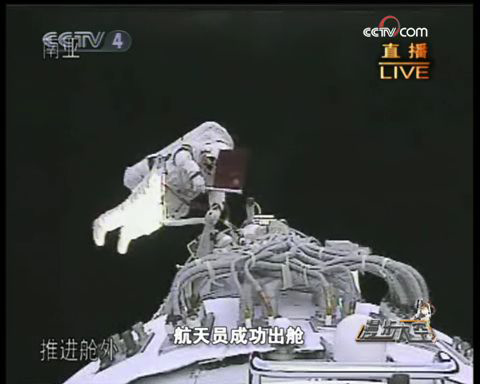神秘内容 Loading...
Chinese astronaut completes nation's first space walk (来源:www.EnglishCN.com)
BEIJING (AFP) — A Chinese astronaut Saturday became the first in his country's history to complete a space walk, a feat President Hu Jintao hailed as a "major breakthrough" for the emerging space power.
Mission commander Zhai Zhigang left the Shenzhou VII spacecraft at 4:43 pm Beijing time (0843 GMT) to float in orbit for just under 15 minutes, making China the third country to complete a space walk after the United States and the former Soviet Union.
"I feel well," said Zhai, the leader of the Shenzhou VII's three-man crew, waving to a camera outside the spacecraft. "I am greeting the Chinese people and the people of the world."
The space walk, broadcast live on television, was the highlight of the 68-hour voyage -- China's third manned foray into space -- and considered an important step towards building a space station, China's next major ambition in space.

"Your spacewalk was a complete success. It's a major breakthrough in the development of our manned space programme," Hu, standing inside the Beijing Aerospace Control Centre, told the astronaut by radio.
"The motherland and the people thank you," Hu said in the televised conversation.
The spacecraft was now due to return to Earth on Sunday at 5:00pm (0900GMT), Wang Zhaoyao, spokesman for China's manned space programme, told reporters.
The space walk was likely to stir up patriotic emotions ahead of China's October 1 National Day, which will mark the 59th anniversary of the founding of the people's republic.
Coming just days before the 50th anniversary of the US National Aeronautics and Space Administration, or NASA, also on October 1, it also marked a potent symbol of the Asian giant's emergence as a space power.
Zhai waved a small Chinese flag shortly after climbing out of the spacecraft 343 kilometres (215 miles) over the Earth, a highly symbolic move.
Tethered to the craft with two safety wires, Zhai, 41, slowly moved towards a test sample of solid lubricant placed outside the orbital module, Xinhua news agency said.
He took the sample and handed it over to fellow astronaut Liu Boming, who stayed in the orbital module and closely monitored Zhai's moves.
The move was a drill intended to replicate the type of task that future space walkers will have to perform.
A fire alert that was heard during the live transmission of the space walk turned out to be a mistake in one of the sensors, Wang said.
"To be frank, at that very moment, many of us felt a little bit concerned," he said.
But he said that after finding out the alarm came from the orbital module outside of which Zhai was conducting his space walk, they relaxed as there was no oxygen in the module, which therefore could not catch fire.
"After a check, we found out that there was a sensor error, so it will not impact our continued mission, please rest assured," he said.
The spacewalk had been eagerly anticipated, while state media had also pointed out the risk associated with the activity.
An "intensive psychological shock" would be unavoidable once the astronaut left the capsule, Xinhua said earlier, citing Yang Liwei, who piloted China's maiden space flight in 2003.
The Chinese Internet offered a forum for local enthusiasts to express their pride over the fledgling space power's achievements.
"Go China! Go Zhigang! We wish you good luck!" said a typical posting on popular web portal Sina.com.
The astronauts, who took off from the Jiuquan Satellite Launch Centre in the desert of northwest China late Thursday, had passed most of their first day in space preparing for the walk.
On Friday, Zhai and Liu spent 10 hours unpacking and assembling the special China-made space suit that was used during the walk outside the Shenzhou craft.
As part of China's space programme, two more unmanned craft will be launched by 2010, as well as another manned spaceship with a crew of three to start work on the lab or space station, according to the China Daily.
After China sent its first man into space in 2003, it followed up with a two-man mission in 2005.
The astronauts also had time Friday to enjoy the view, witnessing 16 sunrises during their first 24 hours in orbit, and to sample the 80-dish menu they brought with them on their mission.
Sleep was necessarily limited, but the spacecraft has sleeping bags hooked to the wall of the craft. However, the astronauts were told to keep their hands inside the bags in order to avoid them accidentally pushing a button while asleep, Xinhua said.
The Shenzhou VII is expected to land in the northern Inner Mongolia region on Sunday
|

